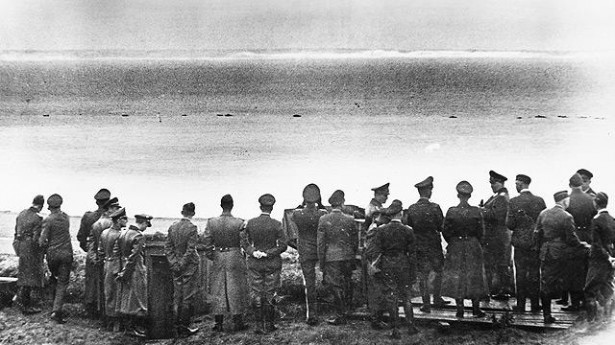Operation Sealion Canceled
Goering, sixth from right, and other German officers look out across the English Channel towards Dover on 1 July 1940. It was as close as they would get to invading. (IWM HU 1185)
As the flag of the Third Reich spread further and further over the European continent—having secured France, Belgium, and the Netherlands in summer 1940—the invasion of Great Britain was the natural next step. The operation, called Seelöwe, or Sealion, was developed that year. A successful invasion would depend on German air supremacy in the skies over Britain, as well as naval supremacy in the English Channel. Some historians believe that Sealion could never have been successful, even with air and sea supremacy, and that Hitler’s real goal in developing the operation was to force Great Britain into capitulation out of her fear of the possibility of an invasion. Sealion’s ultimate aim was to hamper Britain’s ability to carry out war against Germany.
By September 1940, the month in which Sea Lion was supposed to take place, the operation was postponed due in large part to the waning strength of the Luftwaffe. The Kriegsmarine suffered heavy losses in the battle for Norway a few months earlier, which also lessened the feasibility of the operation. Neither Admiral Eric Raeder, commander of the Kriegsmarine at the time, nor Hermann Göring, commander of the Luftwaffe, believed in the plan. It wasn’t until 13 February 1942, however, that all units allocated for deployment in this operation were officially detached from the project and made available for other operations, marking the official end of Operation Sealion. The most notable use for those newly available troops was the ongoing combat following Operation Barbarossa. The German position in the Soviet Union had steadily been declining since December 1941, and they would gain no further territory after this time 70 years ago.
Although Sealion never took place, it still became a source for British propaganda, suggesting that the Germans knew that they were too weak to take on Britain directly. There were some claims, in fact, that Germans did indeed attack the mainland and were successfully repulsed in early September. Hitler’s desire to disable Great Britain may have actually strengthened her will to continue to fight.
This post by curator Meg Roussel
- Posted :
- Post Category :
- Tags :
- Follow responses to this entry through the RSS 2.0 feed. You can skip to the end and leave a response. Pinging is currently not allowed.
One Response to “Operation Sealion Canceled”
Jeff Williams says:
The overwhelming strength of the Royal Navy made the German ‘Operation Sealion’ a difficult prospect to carry out, although books written in the first few decades after World War II usually credit the RAF’s victory in the Battle of Britain as the decisive factor. Interesting books include ‘Invasion 1940′ by Peter Fleming (Hart-Davis, London, 1957)and ‘1940—The World in Flames’ by Richard Collier (Hamish Hamilton, 1979). For a German perspective, see (the English translation from the German of) the book by Egbert Kieser: ‘Operation Sealion’ (Cassell Military Paperbacks, 1997). Jeff Williams




